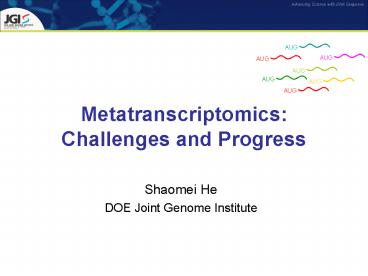Metatranscriptomics: Challenges and Progress - PowerPoint PPT Presentation
1 / 20
Title:
Metatranscriptomics: Challenges and Progress
Description:
AUG AUG AUG AUG AUG AUG AUG Metatranscriptomics: Challenges and Progress Shaomei He DOE Joint Genome Institute * * * * * * * * Metatranscriptomics Metatranscriptome ... – PowerPoint PPT presentation
Number of Views:1139
Avg rating:3.0/5.0
Title: Metatranscriptomics: Challenges and Progress
1
MetatranscriptomicsChallenges and Progress
AUG
AUG
AUG
AUG
AUG
AUG
AUG
- Shaomei He
- DOE Joint Genome Institute
2
Metatranscriptomics
- Metatranscriptome
- The complete collection of transcribed sequences
in a microbial community - Protein-coding RNA (mRNA)
- Non-coding RNA (rRNA, tRNA, regulatory RNA, etc)
- Metatranscriptomics studies
- Community functions
- Response to different environments
- Regulation of gene expression
3
Evolving of Metatranscriptomics
- cDNA clone libraries Sanger sequencing
- Microarrays
- RNA-seq enabled by next-generation sequencing
technologies.
Sorek Cossart, NRG (2010) 11, 9-16
RNA-seq is superior to microarrays in many ways
in microbial community gene expression analysis.
4
Challenges in Metatranscriptomics
- Wet lab
- Low RNA yield from environmental samples
- Instability of RNA (half-lives on the order of
minutes) - High rRNA content in total RNA (mRNA accounts for
1-5 of total RNA)
http//www.nwfsc.noaa.gov/index.cfm
- Bioinformatics
- General challenges with short reads and large
data size - Small overlap between metagenome and
metatranscriptome, or complete lack of metagenome
reference
http//cybernetnews.com/vista-recovery-disc/
5
rRNA Removal Methods
Method rRNA feature used Input RNA Manipulate raw RNA
Before cDNA synthesis Before cDNA synthesis Before cDNA synthesis Before cDNA synthesis
Subtractive hybridization Conserved sequence High Yes
RNase H digestion Conserved sequence High Yes
Exonuclease digestion 5 monophosphate High Yes
Gel extraction Size High Yes
Biased poly(A) tailing 2o structure Low Yes
During cDNA synthesis During cDNA synthesis During cDNA synthesis During cDNA synthesis
Not-so-random primers Sequence feature Low No
After cDNA synthesis After cDNA synthesis After cDNA synthesis After cDNA synthesis
Library normalization w/ DSN High abundance Low No
6
Validation of two rRNA removal kits
Subtractive Hybridization MICROBExpress
Bacterial mRNA Enrichment (Ambion)
Exonuclease Digestion mRNA-ONLY Prokaryotic
mRNA Isolation (Epicentre)
Hyb
Exo
7
Objectives
- Validate the performance of Hyb and Exo kits on
synthetic microbial communities, using Illumina
sequencing to evaluate
- Efficiency of rRNA removal
- Fidelity of mRNA relative transcript abundance
Treatments
Hyb
2 x Hyb
Exo
Hyb Exo
Exo Hyb
8
What we learned
- rRNA removal efficiency for both kits was
community composition and RNA integrity
dependent. - Exo degraded some mRNA, introducing larger
variation than Hyb. - Combining Hyb and Exo provided higher rRNA
removal than used alone, but the fidelity was
significantly compromised. - Hyb had high fidelity, but its performance was
limited by rRNA probe target range and RNA
integrity.
9
Customized subtractive hybridization
Stewart et al, ISME J (2010) 4, 896907
- Customized probes specific to communities of
interest - Probes cover near-full-length rRNA, and should
also capture partially degraded (fragmented) rRNA
It has been applied on marine metatranscriptome
samples to substantially reduce rRNA.
10
Duplex-specific nuclease (DSN)
Yi et al, Nucleic Acids Res, 2011, 1-9
Total RNA
RNA-seq library construction
- Denature ds-DNA at high temp
- Re-anneal to ds-DNA at lower temp.
- DSN degrades DNA duplex which is presumably from
abundant transcripts.
Library normalization using DSN
- Efficient on E. coli (final rRNA 26 11)
- Preserved mRNA relative abundance
- Little reduction of the very abundant mRNA
11
Still efficient and faithful for microbial
communities?
Typical species rank abundance
Environmental microbial communities are very
diverse, with a long tail of minor community
members.
12
Epicentre Ribo-Zero TM Kit
Another subtractive hybridization-based kit.
High fidelity!
- Cindi Hoover, JGI
13
Test on a real sample from cow rumen
Sample rRNA Map (rumen metagenome) Other
No depletion control 82.4 3.4 10.5
Ribo-Zero Metabacteria 15.9 27.7 55.2
Ribo-Zero Metabacteria Human/Mouse/Rat 4.9 26.7 56.3
Effective even on complex metatranscriptome
samples.
- Cindi Hoover, JGI
14
What else about RiboZeroTM kit
Giannoukos et al, Genome Biology 2012, 13r23
- Outperformed other four tested kits/methods
- Effective even on highly fragmented RNA sample
- But needs sufficient input RNA (e.g. gt 1 ug)
- For environmental samples with very low RNA
yield, no rRNA depletion is the recommendation. - How about Archaea?
15
Termite Hindgut Metatranscriptomics
- A case study
- (Preliminary results)
16
Termite samples in this study
- Amitermes wheeleri
- Termitidae
- Subtropical desert
- Cow dung
Species Family Habitat Diet
- Nasutitermes corniger
- Termitidae
- Laboratory colony
- Dry wood
Aim Determine system-specific differences
between termite species with different diets.
17
Overview of sequencing efforts
Nasutitermes Amitermes
(Lab colony) Dry wood (Arizona desert) Cow dung
community analysis 16S pyrotag ? ?
Metagenomics
Sanger at a QC level ? ?
454-titanium ? ?
Metatranscriptomics Illumina GAIIx 1 x 34 bp Illumina GAIIx 2 x 76 bp Illumina GAIIx 2 x ll3 bp 1 lane 1 lane 1 lane 1 lane 1 lane 3 lanes
18
Bioinformatics workflow
- Edward Kirton, JGI
19
Summary
- Metatranscriptomics is being advanced by
next-generation sequencing technologies. - RiboZero kit is promising to knock down high rRNA
content for more effective RNA-seq. - Bioinformatically removing rRNA reads should
increase computational speed in de novo assembly,
and improve the assembly of low-abundance mRNAs.
Need to investigate algorithm that is more
sensitive and computationally efficient to do
this for large datasets.
20
Acknowledgement
- Omri Wurtzel
- Rotem Sorek
- Phil Hugenholtz
- Susannah Tringe
- Edward Kirton
- Kanwar Singh
- Erika Lindquist
- Feng Chen
- Jeff Froula
- Falk Warnecke
- Natalia Ivanova
- Martin Allgaier
- Zhong Wang
- Tao Zhang
- Cindi Hoover
- RD group
- Production group
- Many others!
- Hans Peter Klenk
- Rudolph Scheffrahn
- Jose Escovar-Kousen

